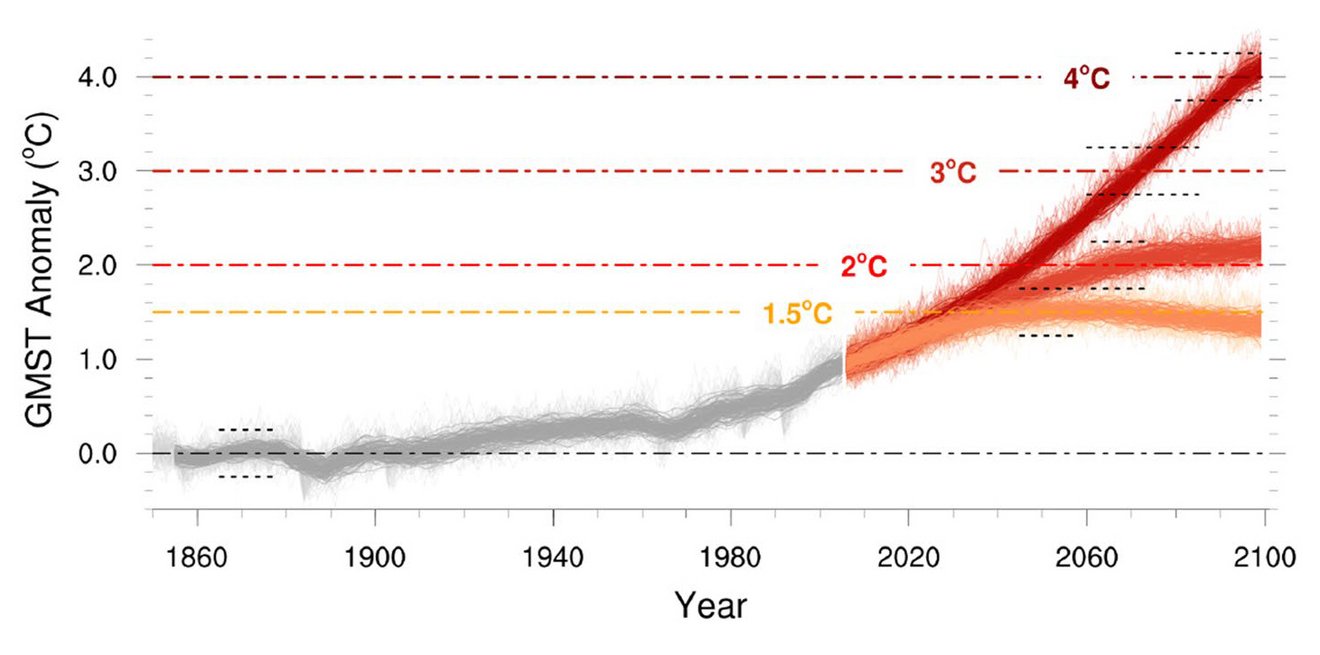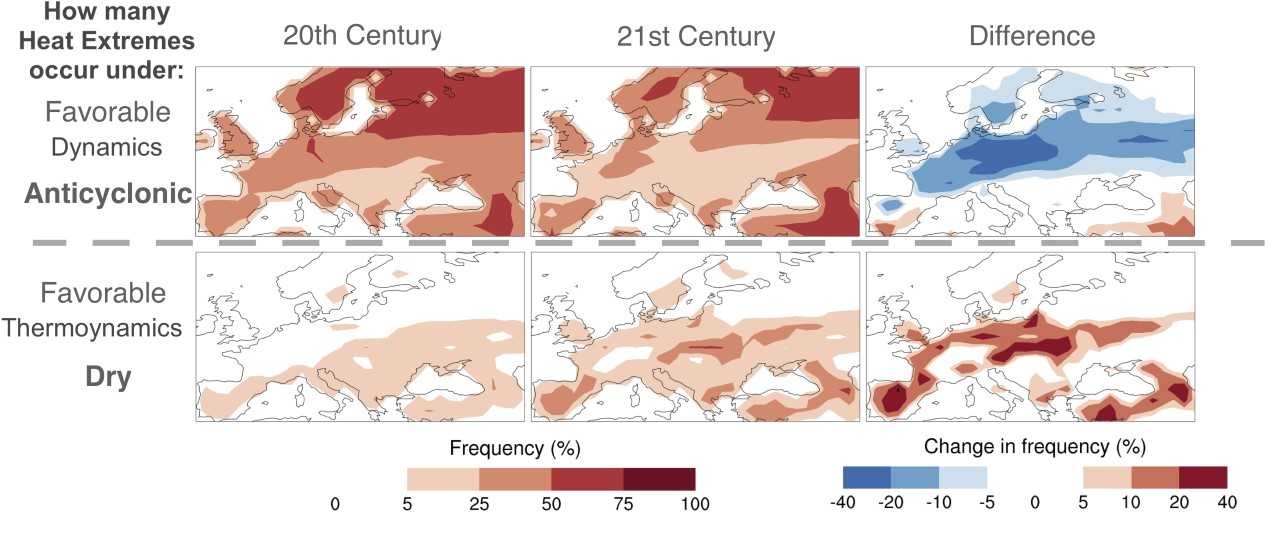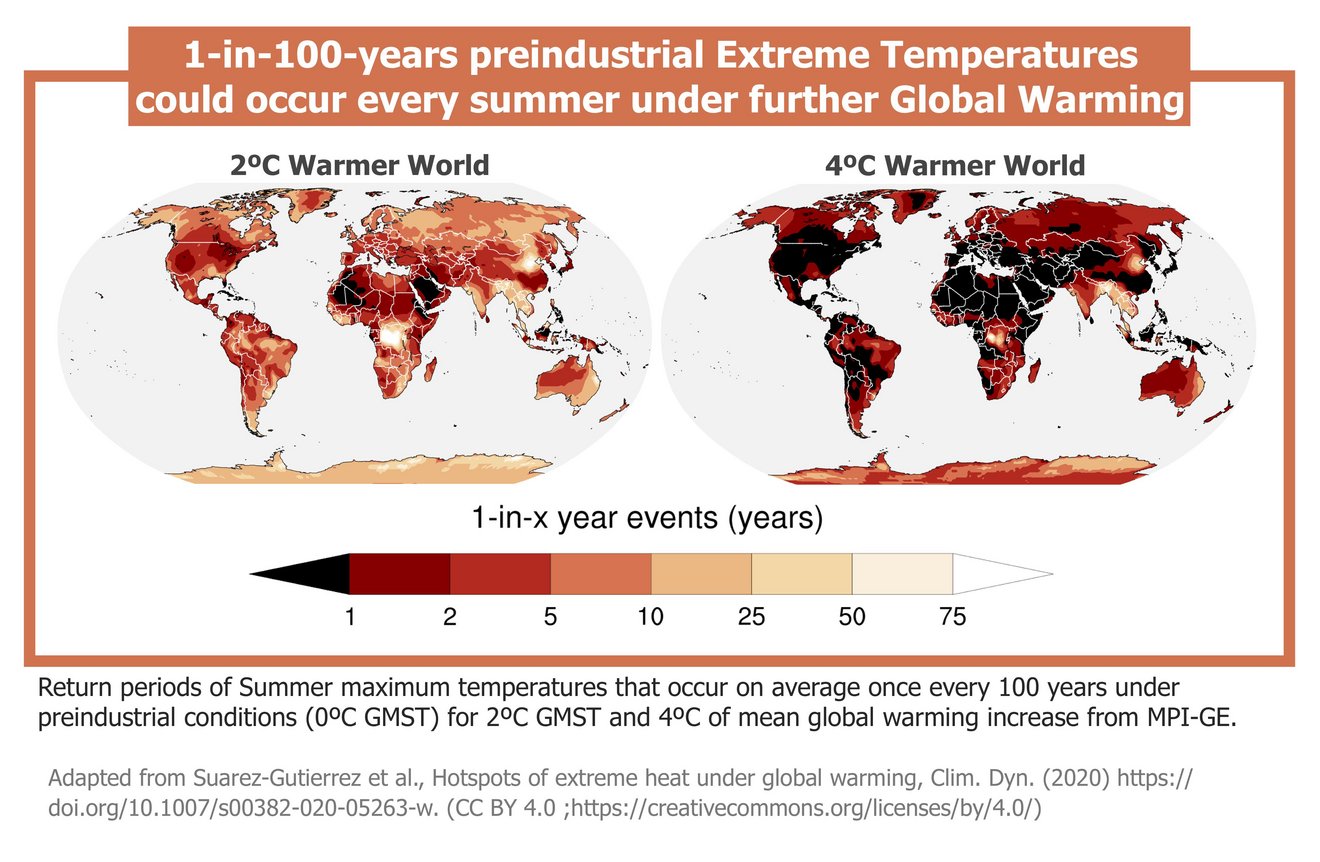Extreme summertime heat in a warmer world: where does it come from, and can we avoid it?

Extreme heat will become more likely and more extreme under global warming. It leads to increased heat-related mortality and illness and can also have ecological and socio-economical impacts, such as decreased labour productivity, increased risk of wildfires, decreased agricultural efficiency, habitat loss, ecosystem and crop failure, as well as render some regions partially uninhabitable. With time and within limits, our society, economy, ecosystems, and even our bodies, are able to adapt to a warmer mean climate state. However, low-probability deviations from these mean climate conditions in the form of extreme events challenge our range of adaptability, potentially to its limits.
MPI-M scientists Dr. L. Suarez-Gutierrez, Dr. W. Müller, Dr. C. Li and Prof. J. Marotzke studied in two new publications what drives extreme heat events, how this changes in a warmer world, and by how much we must limit global warming increase above pre-industrial conditions in order to limit the risk of extreme heat in its different forms. For this, they used the 100-member Max Planck Institute Grand Ensemble (MPI-GE) which is a large ensemble of a single comprehensive climate model. MPI-GE consists of sets of 100 simulations for the historical period (from around 1850 to near-present) and for three possible futures with different levels of global warming. This unique experimental design allows for 1-in-100-years extremes to occur on average every simulated year, providing large samples of low-probability, high-impact extremes. For this, MPI-GE is the best tool available to study how extreme events change and to determine which extremes can be avoided by limiting global warming, versus which extremes are within the range of possibilities for each warming level.

European summer heat extremes
Global warming will make European summertime heat more frequent and more extreme. This will not only be because temperatures are rising globally, but also because the mechanisms that drive extreme heat are changing. In the first study1 the authors quantified how much the two main driving mechanisms of extreme European heat — anticyclonic conditions in the atmosphere and dry conditions in the soil — contribute to this change. Currently, although dry soils cause even higher temperatures, anticyclonic conditions are the decisive driver for extreme heat. However, this is not true in a warmer world. In a warmer future, heat extremes can occur because of dry soils alone, even if the atmosphere plays against it. The study by Suarez-Gutierrez et al. is not only the first to investigate both driving contributions simultaneously but also to evaluate large samples of extreme events developing under a wide range of background conditions. This combination is crucial to distinguish between the conditions that are necessary for the development of extreme heat from those that may be circumstantial. The findings by Suarez-Gutierrez et al. highlight a new type of neutral-atmosphere, drought-driven heat extremes, and confirm that the increase in European heat extremes and associated variability increase are dominated by the local thermodynamic effect of moisture limitation.

Hotspots of extreme heat under global warming
In the second study2 the authors evaluated how hotspots of different forms of extreme summertime heat change under a global warming increase of up to 4°C. Ultimately, their goal is to determine which level of global warming allows to avert the risk of these hotspots, considering the well-defined and irreducible range of extremes that are possible under each warming level. Suarez-Gutierrez et al. found that for global warming levels below 2°C, the most extreme maximum absolute summer temperatures stay below 50°C over most of the world, with some exceptions over maximum temperature hotspots in the Arabic Peninsula, Northern India and Pakistan. However, for warming levels beyond 2°C, this threshold is overshot in all continents, with projected temperatures above 60°C in hotspots over Pakistan, Iraq or Saudi Arabia. They also found that very extreme events that occur on average once every 100 years under pre-industrial conditions occur more often than once every 10 years at 2°C of global warming. At 4°C of warming, these 1-in-100-years events occur from every two years to more than once per summer over most of the world.
Their results also show that previously rare extreme hot and humid conditions and conditions with lack of nighttime cooling, two of the aspects that most gravely exacerbate heat stress, become commonplace over large tropical and non-tropical regions of the globe. These different heat-stress hotspots highlight the different potential risks and related adaptation measures that are vital to battle extreme heat over different regions.
Original publications:
[1] Suarez-Gutierrez, L., Müller, W. A., Li, C., & Marotzke, J. (2020). Dynamical and thermodynamical drivers of variability in European summer heat extremes. Climate Dynamics. doi:10.1007/s00382-020-05233-2.
[2] Suarez-Gutierrez, L., Müller, W. A., Li, C., & Marotzke, J. (2020). Hotspots of extreme heat under global warming. Climate Dynamics. doi:10.1007/s00382-020-05263-w.
Further information:
About the Max Planck Institute Grand Ensemble (MPI-GE)
Contact:
Dr Laura Suarez
Max Planck Institute for Meteorology
Email: laura.suarez@mpimet.mpg.de
Dr Wolfgang Müller
Max Planck Institute for Meteorology
Email: wolfgang.mueller@mpimet.mpg.de
Dr Chao Li
Max Planck Institute for Meteorology
Email: chao.li@mpimet.mpg.de
Prof Dr Jochem Marotzke
Max Planck Institute for Meteorology
Email: jochem.marotzke@mpimet.mpg.de

